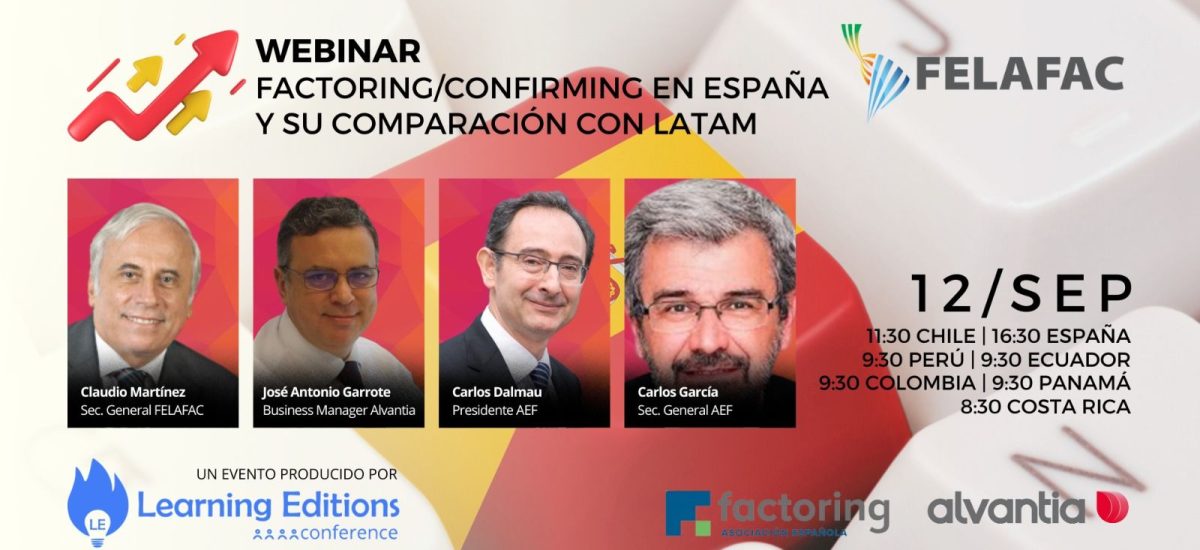Last Thursday, Alvantia participated in the webinar Factoring/Confirming in Spain and its comparison with LATAM, organized by the Latin American Factoring Federation (FELAFAC) and the Spanish Factoring Association (AEF) in collaboration with Learning Editions Conference.
The event, which was attended by experts from 17 countries, was moderated by Claudio Martinez, FELAFAC’s Secretary General, and began with a presentation by Carlos Dalmau, president of the AEF. Dalmau gave an overview of the Spanish Factoring market, in which practically all entities offer both Factoring and Confirming products and whose volumes of activity, over the last 10 years, have been equivalent (50% Factoring, 50% Confirming).
The expert recalled that in 2023, the activity exceeded 270,000 million euros, consolidating a post-pandemic growth of almost 50%. He also pointed out that in Spain, Factoring and Confirming account for 18.5% of GDP, one of the highest percentages in European economies, and that the use of these products has been growing steadily year after year.
Among the main issues occupying the sector, Dalmau mentioned, among others, the upcoming implementation of mandatory electronic invoicing in the private sector, the Inblock project (the first consortium project developed within the AEF to reduce the risk of fraud and increase SMEs’ access to working capital financing) and sustainability applied to trade finance.
Next, Carlos García Casas, Secretary General of the AEF, explained the main characteristics of Factoring in Spain, as well as its main modalities and the different product options. In this sense, García indicated that in general, the vast majority of Factoring is national, without recourse and with private debtors. “It is understood as a strategic service, within a global relationship model with corporate clients, which applies to any client segment, with a high level of loyalty and laborious operations, with non-financial components and with the risks inherent to working with commercial credit portfolios”, commented the expert.
Regarding Confirming, he indicated that it is conceived as a comprehensive payment management service, which provides certainty to the supplier, is in continuous evolution and is fully automated/digitized. As for the keys for the entities that provide it, the expert highlighted its good profitability over risk, the potential for capturing business (thanks to the contact with numerous suppliers), its high digitalization (García clarified that it requires a complete and scalable solution) and its recurrence (thanks to the high linkage with the client/payer).
The event ended with an exhibition by José Antonio Garrote, Business Manager of Alvantia, who mentioned some differences between the Spanish and Latin American markets. In this regard, he highlighted the use of electronic invoicing (mandatory in most Latin American markets, but not in Europe), centralized repositories (also present in Latin America, but not in Europe), the use of advanced products (which is much more widespread in the European market), interest rates (which are higher in the Latin American market) and sources of financing (in Latin America, fundraising from third parties is included in the business model).
As Garrote pointed out, while in Europe we find very mature markets, in Latin America there is still a lot of work to be done, since the market is still in a development phase: “they still have a long way to go in terms of digitalization and process automation; however, sooner rather than later, the markets will reach a higher degree of maturity that will force institutions to make a qualitative leap towards more advanced products,” Garrote emphasized. In this sense, he recalled that having mature, advanced and fully digital technological platforms, such as Alvantia‘s, can be a competitive advantage and a guarantee of success for financial institutions.


